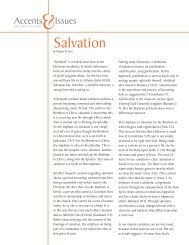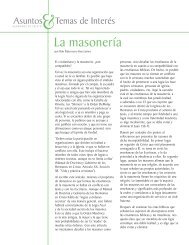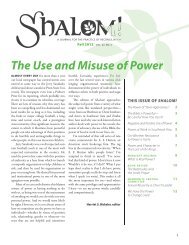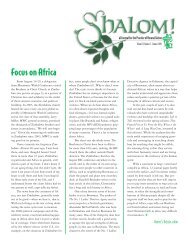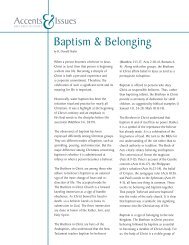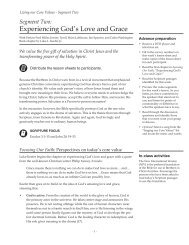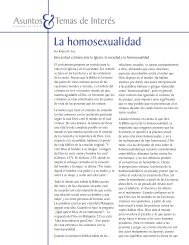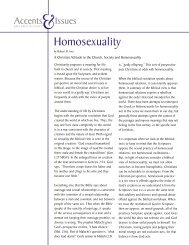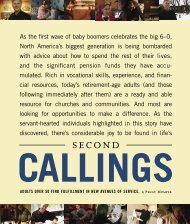Summer 2009 - Brethren in Christ Church
Summer 2009 - Brethren in Christ Church
Summer 2009 - Brethren in Christ Church
You also want an ePaper? Increase the reach of your titles
YUMPU automatically turns print PDFs into web optimized ePapers that Google loves.
few years ago, I had a conversation with a friendabout church discipl<strong>in</strong>e. This friend—a committed<strong>Christ</strong>ian and a faithful churchgoer—admitted that hefound the idea of church discipl<strong>in</strong>e outdated. “There’s onlyone k<strong>in</strong>d of discipl<strong>in</strong>e that’s relevant <strong>in</strong> the North American<strong>Church</strong> today, and that’s self-discipl<strong>in</strong>e,” he said. Hispo<strong>in</strong>t, if I understood him correctly, was that, rather than<strong>in</strong>stitut<strong>in</strong>g corporate policies and practices that call peopleto account, church leaders should devote their energies tohelp<strong>in</strong>g <strong>in</strong>dividuals develop spiritual practices and moralconvictions that serve to discipl<strong>in</strong>e their own lives.I couldn’t tell if my friend lamented this situation ornot. Did he th<strong>in</strong>k that discipl<strong>in</strong>ary procedures were themselvesa problem? Or were my friend’s observations simplypragmatic, based upon the assumption that corporatediscipl<strong>in</strong>e was no longer practical, given the way churchlife functions <strong>in</strong> contemporary North America?I suspect it was the latter, and for good reason. Nearlyeveryone who studies long-term trends <strong>in</strong> North Americanchurch life will tell you that a consumerist orientationhas more or less won the day, particularly <strong>in</strong> Protestantcircles. The fact of the matter is this: North Americanchurches compete with one another for adherents, andmany adherents choose a particular church based on thegoods and services they f<strong>in</strong>d there. That’s not to suggestthat these adherents don’t contribute anyth<strong>in</strong>g to theirchurches; it’s rather to say that, <strong>in</strong> the process of mak<strong>in</strong>gthose contributions, most churchgoers conduct an <strong>in</strong>formalcost-benefit analysis. If the costs are too high andthe benefits too low, they will likely start to shop around.This market analogy sounds crass, Iknow, but my own experience bearsit out. A year ago my wifeand I left one church,and we now attend another. Although the process ofleav<strong>in</strong>g our former church was emotionally wrench<strong>in</strong>g,we were ultimately attracted to our new church becauseof its perceived benefits: Not only was it nearer to ourrecently purchased home, but it offered theologicalemphases we valued, a worship style we enjoyed, andready-made peer groups for our pre-adolescent sons.Chang<strong>in</strong>g churches once <strong>in</strong> a 10-year span may not makeme a pathological church shopper, but compared to mygrandfather—who was born, baptized, and buried <strong>in</strong> thecontext of one congregation—I’m a ready participant <strong>in</strong>America’s religious marketplace.<strong>Church</strong> discipl<strong>in</strong>e <strong>in</strong> a religious marketplaceWhether we like it or not, this marketplace analogyhas real implications for how we th<strong>in</strong>k about discipl<strong>in</strong>e<strong>in</strong> the <strong>Church</strong> today.Traditional models of discipl<strong>in</strong>e as practiced by <strong>Brethren</strong><strong>in</strong> <strong>Christ</strong> congregations <strong>in</strong> the past were developeddur<strong>in</strong>g a time when churches were more ak<strong>in</strong> to familiesthan marketplaces. Th<strong>in</strong>k about a family: Not only is afamily comprised of relatively few people, but the membersare “familiar” with one another. Moreover, unlike ourfavorite stores and restaurants, families are not someth<strong>in</strong>gwe choose. We may not appreciate everyth<strong>in</strong>g about ourfamilies, but we don’t typically go shopp<strong>in</strong>g for anotherone. In fact, ongo<strong>in</strong>g connections with family membersare assumed, and it’s considered tragic if those connectionsare broken—much more tragic than if we breakour ties with our favorite home improvement store.To be sure, most of you read<strong>in</strong>g these words are morecommitted to your local churches than you are to HomeDepot or Lowe’s. Still, it’s possible that your local churchis more ak<strong>in</strong> to your favorite store than it is to yourbiological family. And that means traditional discipl<strong>in</strong>arypractices don’t work very well, because consumers, when



